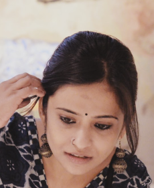Translated from the Bengali by Ankita Bose
The women of our neighborhood, after they are done with their kitchen duties and lunch, gather one by one in our courtyard with their mats and talai. Some resume needlework on Sujni Kantha. Some knit wool balls into sweaters or beanie hats for their young ones; some weave date palm leaves into mats. It feels almost like a mini jamboree. Amid all the business are discussed the myriad happenings of the world—like the wife who tricked her husband and made a go for another man; the son who left for work in Kerala and never sends a penny home for the old parents, or the one who is with a child again before even weaning the first one and so on. Sometimes they discuss television serials or popular cinema. Once the evening Azaan rolls, they collect their belongings and prepare to leave.
“A wall, that’s what this house needs. Tawdry tramps, messing around the courtyard, all the time. One cannot even catch a moment’s respite under that stupid constant quacking,” an annoyed Baba declared over dinner one day.
Mother retorted, “What’s your problem! Why’re your eyes burning! People are supposed to visit other people. If that troubles you so much, go live in a jungle instead.”
But Baba is a man of his word. Within a few days, he erected a boundary wall around our house. A door was affixed too, so it remains locked from the inside. When somebody comes, they’d need to call out from the outside, and only then would the door be opened.
After the wall, the number of women in our afternoon gathering began dwindling one by one till it snuffed out completely.
Lately, I notice Maa leaving with her stitching kit as soon as it’s afternoon.
“Where’re you going?” Baba asked.
“To Jafar Bhai’s house.”
Jafar Chacha’s house is right by the concrete road. One morning, I saw masons working in front of the house. Jafar Chacha’s eldest lad, Miyakat, was laying the foundation. I stood there and watched. Miyakat himself grinned and said, “As soon as the harvest is brought in from the field, I plan to get hitched. A new wife will be brought home. You tell me, Bhombol, does the house have any respect if there are no walls or fences?”
Eventually, the afternoon meeting ceased at Jafar Chacha’s house as well. Maa also stopped going out.
In the span of just a few years, our neighborhood changed a lot. The by-lanes and roads—all of them are now concrete. One can hardly spot any mud hut. Everybody owns a pucca house. Everyone, in their own capacity, lives on their own behind their walls and fences. The aroma of chicken being cooked in one house, or pulao being steamed in another, can no longer penetrate the walls and waft into other houses.
Nowadays, I find Maa basking in the afternoon sunshine sitting on a wicker mat in our courtyard, busy with her needlework, mumbling, and crooning to herself.
I ask her, “Who do you talk to, Maa?”
She replies, “Do I have a lack of people to talk to, have a look at this,” she spreads out her Sujni Kantha.
I see not a Kantha, Maa has stitched an entire courtyard. Each pattern and stitch thrives with life. No one was left out: Jafar’s mother, Ansura Chachi, Nayamul’s wife, Hena Bhabhi, Tera Siddiqui’s wife, Dulehar, and all others—women from around the neighborhood. Courtyard resurrected by Maa’s own hands—the one that has no wall—is far grander than the closed sliver of the courtyard in front of our house.
Also, read an Assamese fiction by Swati Hazarika, translated into English by Anindita Kar, and published in The Antonym:
Follow The Antonym’s Facebook page and Instagram account for more content and exciting updates.



























0 Comments